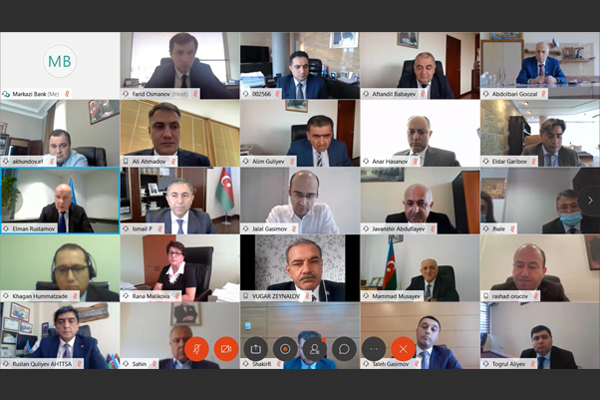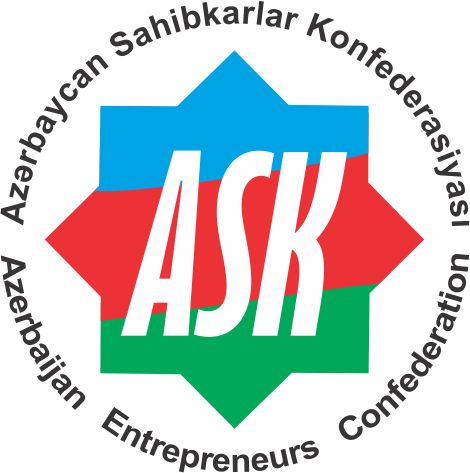The next meeting of the Cooperation Council with Entrepreneurs under the Management Board of the Central Bank was held

The next meeting of the Cooperation Council with Entrepreneurs under the Management Board of the Central Bank was held on September 16 this year in online format. The meeting was attended by representatives of the National Confederation of Entrepreneurs (Employers) of the Republic of Azerbaijan, the Azerbaijan Banks Association, entrepreneurs and the banking sector, as well as other non-members of the Council. The meeting was also attended by Chairman of the Parliamentary Committee on Economic Policy, Industry and Entrepreneurship Tahir Mirkishili, Director of the Bank Training Center Javanshir Abdullayev.
This meeting of the Council was dedicated to discussing the challenges faced by entrepreneurs in the pandemic and ways to cooperate with the banking sector to overcome this situation.
Opening the meeting, Chairman of the Central Bank Elman Rustamov noted that the Council’s past activities show that Establishing an active dialogue between the banking sector and business has become a very effective platform for cooperation in identifying the challenges faced by entrepreneurs and finding solutions, evaluating the work done to improve access to financial services and determining new needs.
Some of the issues raised at the previous meetings of the Council have been implemented, others are in the process of implementation, and some issues are being discussed. Among the work done to support entrepreneurs, the importance of the amendments to the relevant Rules in order to increase the effectiveness of the current currency regime, especially for import operations of entrepreneurs was noted. Active work has also begun to bring to the country the experience of conducting checks in trade transactions. The introduction of this mechanism will create conditions for the transparency of business settlements, reduce the need for daily liquidity of partners in trade operations, attract additional resources from the bank by providing checks as collateral, as well as reduce cash flow in the country. At the same time, the processes taking place in the business sector are deeply analyzed by the Central Bank, and the problems of the sector are constantly monitored. In general, active work is being done to address other issues raised by the Council.
Before moving on to the agenda, E. Rustamov briefed the participants on the consistent work done under the direct leadership of the President to reduce the impact of the global economic crisis on the coronavirus pandemic and the sharp fall in oil prices on international energy markets. He spoke about the urgent measures taken and the tasks facing the financial sector in this direction. He noted that the macroeconomic situation in the country and the tasks facing the institutions of economic regulation and the financial sector in connection with socio-economic development are always in the spotlight. Despite the negative effects of the pandemic, the country maintains macroeconomic and financial stability. Inflation is at an acceptable level, the national currency is stable. The created platform of macroeconomic stability has allowed to pursue a countercyclical monetary policy. In pursuing this policy, the Central Bank seeks to support economic activity and employment while maintaining macroeconomic and financial stability.
Noting the assistance provided by the Central Bank to banks and banks in turn to increase support for entrepreneurs in the event of a pandemic, he said that since the beginning of the year, the banking sector has received about $ 1 billion in several areas. Liquidity support was provided in the amount of AZN. As a result of the work done to fulfill the instructions of the President, business loans and mortgage loans increased during this period, while consumer loans decreased. Since the beginning of the year, regulatory requirements for loans to entrepreneurs engaged in export activities have been relaxed, and regulatory requirements have been tightened in order to reduce consumer lending. Problem banks were removed from the sector and the population’s deposits on these banks were returned. In order to minimize the negative effects of the pandemic, a number of prudential regulations have been relaxed, recommendations have been made to increase capital buffers and restructure the loans of economic entities affected by the pandemic. To date, 886 million manat loan out of 49,000 borrowers was restructured. Restructuring of the loan portfolio was actively carried out on the initiative of the banks, along with the regulatory easing measures of the Central Bank. Within the framework of the self-employment program, with the encouragement of the Central Bank, banks provided various assets to vulnerable groups. In order to increase access to financial resources in rural areas, the Central Bank has launched a joint project with relevant agencies.
After the introductory speech, Elman Rustamov invited the participants to discuss the issue on the agenda. Discussions began on the difficulties faced by entrepreneurs in the pandemic and ways to cooperate with the banking sector to overcome this situation. President of the Azerbaijan Entrepreneurs Confederation Mammad Musayev spoke about the practical benefits of the dialogue between the banking sector and entrepreneurs, noting that the Economic Council, established to further increase the efficiency of economic governance in the country, will play a major role in private sector development. Therefore, we must work actively to bring to the attention of the Council the issues that are relevant as a result of our discussions. He also addressed a number of issues, including the solution of the shortage of working capital of entrepreneurs, the active use of checks, the return of entrepreneurs’ funds in closed banks, the settlement of non-cash settlements, the acceleration of numerous disputes in the courts, a number of legislative changes. At the same time, he suggested to prioritize the emerging problems and dedicate the next meetings to the discussion of specific issues.
Chairman of the Parliamentary Committee on Economic Policy, Industry and Entrepreneurship Tahir Mirkishili praised the Council’s work in resolving the problems in the dialogue between the banking sector and the private sector and said that the Committee is ready to support the solution of legislative issues. He said that currently, on the instructions of the President, a comprehensive analysis of economic legislation is being carried out, active work is being done to change the provisions that do not meet modern requirements, hinder business development, and create an economic and legal framework that meets new challenges. I invite you to take an active part in this work and bring to your attention that Mr. President, the Government and the Milli Majlis are always with honest, healthy business representatives.
In his speech, President of the Azerbaijan Banks Association Zakir Nuriyev noted the difficulties in the current activities of banks as a direction of the business sector and praised the changes made by the Central Bank in the regulatory framework of the banking sector, the application of appropriate support measures. He noted that while financial support and the application of appropriate incentive mechanisms are more important, especially in areas most affected by the pandemic, at the same time, banks have difficulty taking on the additional risks of these businesses. He also noted the expediency of considering the possibility of extending the period of appropriate regulatory easing measures in banks.
In his speech, Director of the Bank Training Center Javanshir Abdullayev noted the importance of the Council as an important platform for cooperation between the financial and banking sector and entrepreneurs in terms of providing the necessary support to business, especially in a pandemic. Regarding the regular analysis of surveys conducted among entrepreneurs, he said that in the current economic environment, the number of solvent businesses is declining. In many cases, their business plans are not developed to the satisfaction of banks. He noted the importance of separate state support funds for business, as well as the need to consider the possibility of consolidating their activities in the current situation. He also said that, as is the case in international practice, especially in Turkey and Malaysia, it is advisable for banks to prefer the use of state guarantee mechanisms to support business.
After that, well-known businessman Abdolbari Goozal and other participants spoke about promoting the development of local industries in the domestic market, especially the continuation of concessions on credit obligations to the banking sector in areas most affected by the pandemic, the allocation of new loans to address working capital shortages. They noted the need to take additional measures to improve the regime, speed up the implementation of check settlements, simplify the requirements for microcredit mechanisms, the wider use of guarantee mechanisms to activate business lending and other issues.
In conclusion, he noted that the Economic Council is concerned with expanding business relations, the participants continue their entrepreneurial activities, the discussion of topical issues raised by entrepreneurs helps to find solutions to the problems they face, both in the real sector and in the financial system. continues its activities.
In conclusion, he noted that the Economic Council is also involved in expanding business relations, the participants of the meeting continue their entrepreneurial activities, where the discussion of topical issues raised by entrepreneurs helps to find solutions to the problems they face and it will be an important support to the activities of business entities, both in the real sector and in the financial system as a whole.
